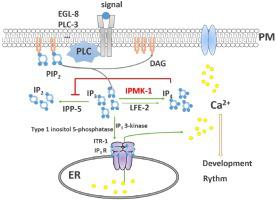Cell Calcium ( IF 4.3 ) Pub Date : 2020-12-01 , DOI: 10.1016/j.ceca.2020.102327 Zhong-Lin Yang 1 , Jian-Ning Chen 2 , Yu-Yang Lu 2 , Min Lu 2 , Qin-Li Wan 3 , Gui-Sheng Wu 4 , Huai-Rong Luo 5

|
Inositol polyphosphate multikinase (IPMK) is a conserved protein that initiates the production of inositol phosphate intracellular messengers and is critical for regulating a variety of cellular processes. Here, we report that the C. elegans IPMK-1, which is homologous to the mammalian inositol polyphosphate multikinase, plays a crucial role in regulating rhythmic behavior and development. The deletion mutant ipmk-1(tm2687) displays a long defecation cycle period and retarded postembryonic growth. The expression of functional ipmk-1::GFP was detected in the pharyngeal muscles, amphid sheath cells, the intestine, excretory (canal) cells, proximal gonad, and spermatheca. The expression of IPMK-1 in the intestine was sufficient for the wild-type phenotype. The IP3-kinase activity of IPMK-1 is required for defecation rhythms and postembryonic development. The defective phenotypes of ipmk-1(tm2687) could be rescued by a loss-of-function mutation in type I inositol 5-phosphatase homolog (IPP-5) and improved by a supplemental Ca2+ in the medium. Our work demonstrates that IPMK-1 and the signaling molecule inositol triphosphate (IP3) pathway modulate rhythmic behaviors and development by dynamically regulating the concentration of intracellular Ca2+ in C. elegans. Advances in understanding the molecular regulation of Ca2+ homeostasis and regulation of organism development may lead to therapeutic strategies that modulate Ca2+ signaling to enhance function and counteract disease processes. Unraveling the physiological role of IPMK and the underlying functional mechanism in C. elegans would contribute to understanding the role of IPMK in other species, especially in mammals, and benefit further research on the involvement of IPMK in disease.
中文翻译:

肌醇多磷酸多激酶 IPMK-1 通过 IP3/钙信号调节秀丽隐杆线虫的发育
肌醇多磷酸多激酶 (IPMK) 是一种保守的蛋白质,可启动肌醇磷酸胞内信使的产生,对调节各种细胞过程至关重要。在这里,我们报告了与哺乳动物肌醇多磷酸多激酶同源的线虫IPMK-1,在调节节律行为和发育中起着至关重要的作用。缺失突变体ipmk-1(tm2687)显示出较长的排便周期和延迟的胚胎后生长。功能性ipmk-1的表达::在咽肌、蚜虫鞘细胞、肠道、排泄(管)细胞、近端性腺和受精囊中检测到 GFP。IPMK-1 在肠道中的表达对于野生型表型来说是足够的。IPMK-1 的 IP3 激酶活性是排便节律和胚胎后发育所必需的。ipmk-1(tm2687)的缺陷表型可以通过 I 型肌醇 5-磷酸酶同系物 (IPP-5) 的功能丧失突变来挽救,并通过培养基中的补充 Ca 2+改善。我们的工作表明,IPMK-1和信号分子三磷酸肌醇(IP3)途径调制节律行为和发展通过动态地调节细胞内的Ca的浓度2+在秀丽隐杆线虫. 在理解 Ca 2+稳态的分子调控和生物体发育的调控方面取得的进展可能会产生调节 Ca 2+信号以增强功能和对抗疾病过程的治疗策略。阐明 IPMK 的生理作用和在线虫中潜在的功能机制将有助于了解 IPMK 在其他物种中的作用,尤其是在哺乳动物中,并有利于进一步研究 IPMK 与疾病的关系。






























 京公网安备 11010802027423号
京公网安备 11010802027423号